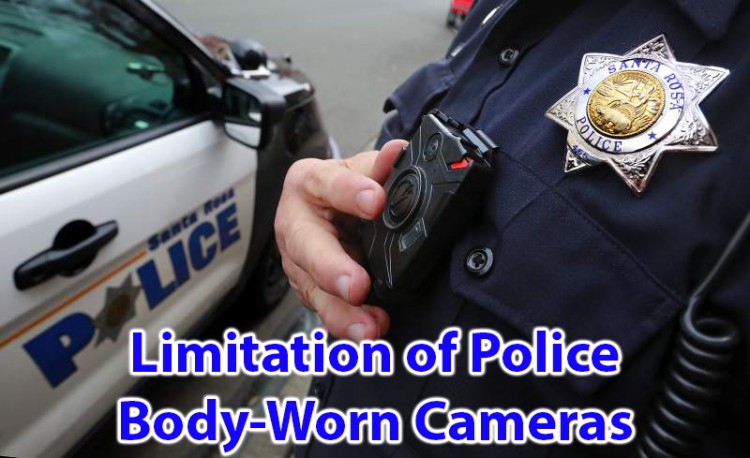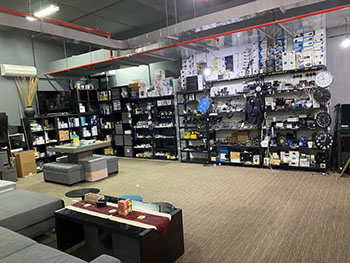Limitations of Police body worn cameras

By each passing day, population of this world is increasing. This is also giving a sharp rise in technology and science. Now a day, we can see a lot of sublime inventions near us. These inventions make our lives easier. With the increasing population of a major city, there will definitely be a drastic increase in the crime rate. City Police has to deal with problems every day. For their ease, science has helped us by giving us Body Worn Cameras.
What is a Body Worn Camera?
Body Worn Cameras are as the name indicates, cameras that are worn on the body of an individual. As a result, the camera records the everyday life of that specific person. It is like have an extra eye. The camera is fitted in a metal box that has a battery in it. The battery is chargeable. The box is then attached to the front facing side of the individual’s body. So, the daily routine of that person is recorded in the camera. The recording made by the camera is saved in a memory card attached to the box so that the recording can be seen anytime.
Uses of Body Worn Cameras:
Body Worn Cameras provide great help in a policeman’s daily life. If we see clearly, then we can see many advantages in this product. It behaves like a third eye in a way by increasing the sense of sight of the individual. It can be said because sometimes a person does not notice a minor detail around him with his eyes. But with the camera, he can see that again and again making it easy for him to point out the minor detail.
Limitations of Body Worn Cameras:
Apart from the various advantages that the body worn camera has, it has a lot of limitations as well.
Let’s have a quick look at some of the limitations of Body Worn Cameras:
Storage Problem:
It is another one of the main problems that the police department is facing now a day. This is the biggest limitation of body worn cameras. Recording of data from places of crime does not matter but constantly playing long recordings also require a lot of storage spaces. That makes it a big limitation of body worn cameras that they cannot store the data that is recorded. What if they destroy and erase the old data? It would also be very bad for the department. We can see years old cases opening suddenly out of nowhere. Therefore, they cannot take this step and erase the old data. They must keep all the data which is a big problem for the department.
We have also seen that body worn cameras have a limit to what they can record at a time. This thing acts as a big limitation for the camera. It will cause trouble for the officers. Let’s suppose the police individual is going for an investigation. The camera records the whole part but just as he enters the most important part, the camera’s limit gets full and it stops recording. Therefore, this is a big limitation of the body worn cameras that gives it a big disadvantage.
Battery Timing:
Another thing that effects the performance of the body worn cameras is the battery timing. Usually, body worn cameras are attached to the frontal side of the police officer uniform. It does not seem to be charged all the time so it must be running with a battery. The battery timing must be long lasting. But in case of long recordings that usually take a lot of time, these cameras usually get their batteries down. To charge these, the batteries have to be detached from the case. This is a big limitation of these cameras that needs to be solved.
Permissions and Proper Usage:
One of the most substantial questions police departments have faced in evaluating Body Worn Cameras is how to identify which type of encounters officers should record.
Without proper navigation, officers could have used the body cameras at places where they must not have used them and at the same time, they could have switched off their cameras at a place where recording was necessary. This could have destroyed a lot of important evidence from the scene.
We cannot exactly say that this is a limitation of body worn camera but it is the limitation of the department using it.
First Approach:
There are two main approaches showed in several studies when it comes to discretion when to record. One approach is to require officers to record all encounters with the public, including not only during calls for service but also during informal conversations with the civilians. According to a public Forum, requiring officers to record every encounter with the public could undermine community members’ privacy rights and damage police-community relationships. Therefore, this has a big throw back. Most of the witnesses prefer themselves to not being seen on the camera or recorded. This becomes a problem for the officers while asking questions from them.
Second Approach:
Second, the more common approach is to require officers to activate their body cameras only when responding to calls for service and during law enforcement-related activities such as arrests, searches, traffic stops, interrogations, and pursuits. Recording the events at a live crime scene should help officers capture spontaneous statements that might be useful in the later investigation.
Privacy
It is obvious that the emergence of new technologies and social networks have changed the way people consider their privacy, but the recordings made by the body-worn cameras might allow for the potential use of facial recognition technology.
The usage of Body Worn Cameras gives officers an opportunity to record sensitive situations, but also to record inside private homes when arresting or doing research. In regard to that, some law enforcement agencies have taken the position that officers have the right to record inside private houses as long as they have a legal right to be there. This, as a result, disturbs the privacy of many people that is not good for the police.








